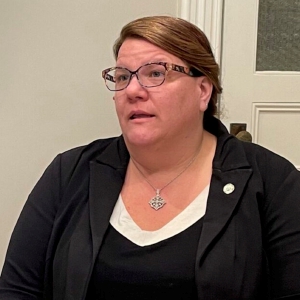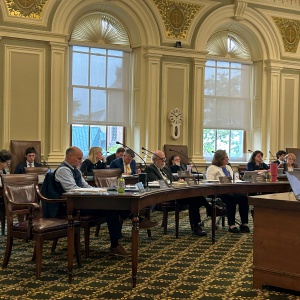Opinion: New Hampshire’s approach to addressing pandemic learning loss is an urgent crisis

An elementary school student creates chalk art at Frye Elementary School in Chandler, Arizona in 2023. Darryl Webb / AP
| Published: 03-30-2024 7:00 AM |
Heidi Crumrine is an English teacher and literacy coach at Concord High School where she has taught since 2004. Before coming to CHS, she taught for three years in the New York City public schools. As the 2018 New Hampshire Teacher of the Year, Heidi’s writing has been published in the Concord Monitor, Education Post, New Hampshire Bulletin, Granite Post, blogs for Teaching4Tomorrow, Heineman, and the National Network of State Teachers of the Year. She is the author of 50 Strategies for Motivating Reluctant Readers.
Like many states, New Hampshire’s current education landscape has been profoundly shaped by the challenges and aftermath of the pandemic. Billions of federal dollars via three stimulus acts have flowed down to states and localities to assist with a variety of issues, including learning loss. But that money won’t be available much longer, and there are some significant issues with the way New Hampshire has chosen to deploy those critical dollars, due to decision-making being made from a top-down approach with no agency or buy-in from teachers.
As both a teacher and a parent, I know two things to be true. First, teacher burnout and retention have continued to be pressing issues, with educators in New Hampshire facing low wages and inadequate support. Teachers in New Hampshire earn $37,000 as a starting salary annually, equating to approximately $16/hour after taxes, the same as many student after-school jobs in our state. As federal funding for educational initiatives expires, this is unsustainable, and something needs to change to lessen the load off teachers’ backs.
Second, it is imperative that we address and prioritize the learning loss experienced by our students. Students’ test scores in New Hampshire, while typically higher than the national average, followed the national decline during the pandemic. For example, only 29% of the state’s 8th graders and only 40% of the state’s 4th graders were proficient in math in 2022. In Rochester, New Hampshire, a district with a 4,000 student population, where over half live in poverty, lost nearly 2 years’ worth of reading progress despite schools providing mostly in-person instruction during the 2020-2021 school year. The need for safe and sustainable tutoring services to close this learning gap has never been more apparent, particularly as we strive to find ways also better to support our educators.
To address these two issues, the New Hampshire Department of Education has entered into a contract with tutor.com to counteract learning loss and teacher burnout via the NHED Tutor.com program. While well intentioned, is the chosen vendor, tutor.com, doing more harm than good for our students, teachers, and the state?
As news is swelling around legislation that could ban Chinese-owned TikTok, I learned that tutor.com is also owned by the same Chinese holding company as TikTok, Primavera Holdings. This means it operates under the jurisdiction of Beijing, which could compel the company to hand over any data upon request by the Chinese Communist Party (CCP). The tutor.com privacy policy states that the entity owns all user data, can disclose personal information to third parties, affiliates, and government entities; and will collect information automatically, such as a student’s ID number, name, or IP address. This pertains to all students who use the platform, many of whom are 4th and 5th graders, for whom the NHDOE recently expanded access in January 2024.
Why would the department knowingly enter or remain in contact with a company that could jeopardize the data security of our citizens? Why not use off-duty teachers or American tutoring providers? This brings back deja vu from when the Board of Education decided to partner with conservative group PragerU for online high school classes, which resulted in public outcry and clawback from constituents last year. Both this example and its current partnership with tutor.com bring into question the department’s decision-making and what political and financial arrangements may be happening behind closed doors.
To safeguard the educational future of New Hampshire students, it is imperative that we take decisive action. Firstly, we must sever ties with foreign-owned tutoring programs that pose national security risks to minors. Instead, we should prioritize partnerships with reputable U.S.-based companies that adhere to strict data protection measures. Additionally, we must invest in accessible, high-quality tutoring programs that supplement traditional K-12 curricula and alleviate the burden on teachers. By partnering with U.S.-owned companies, we can ensure that students receive the individualized instruction they need while safeguarding their personal data from foreign influence.
Article continues after...
Yesterday's Most Read Articles
 By all appearances, Canadians are leery of coming to NH
By all appearances, Canadians are leery of coming to NH
 Helen Hanks resigns as Department of Corrections commissioner
Helen Hanks resigns as Department of Corrections commissioner
 “A dream come true” – Family opens housing for adults with disabilities in Concord
“A dream come true” – Family opens housing for adults with disabilities in Concord
 N.H. Senate passes bathroom bill, sending it to Ayotte’s desk
N.H. Senate passes bathroom bill, sending it to Ayotte’s desk
 Catherine Masterson named next superintendent of Merrimack Valley and Andover starting in 2026
Catherine Masterson named next superintendent of Merrimack Valley and Andover starting in 2026
 ‘You made a difference’ — Belmont baseball seniors honor their educators
‘You made a difference’ — Belmont baseball seniors honor their educators
The time to act is now before federal funding expires for these critical programs. By prioritizing student data safety and investing in secure tutoring partnerships, we can combat learning loss, support our educators, and improve educational outcomes for New Hampshire students. Let us seize this pivotal moment to build a brighter future for our children and our state.







 Opinion: Unfair taxes, unfair schools: The New Hampshire way
Opinion: Unfair taxes, unfair schools: The New Hampshire way Opinion: In the fight to stop sexual violence, can polio hold the solutions?
Opinion: In the fight to stop sexual violence, can polio hold the solutions? Opinion: Where are the permanent solutions for a more stable budget?
Opinion: Where are the permanent solutions for a more stable budget? Opinion: My memories of Vietnam 50 years later
Opinion: My memories of Vietnam 50 years later
